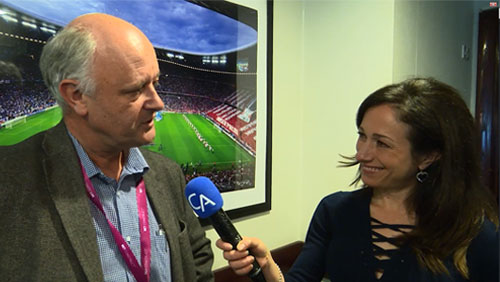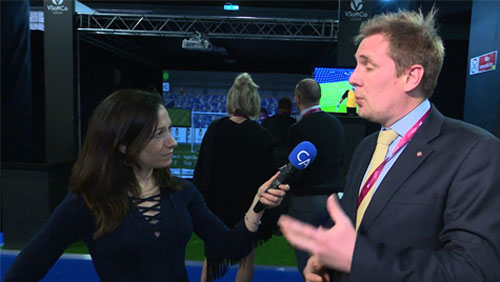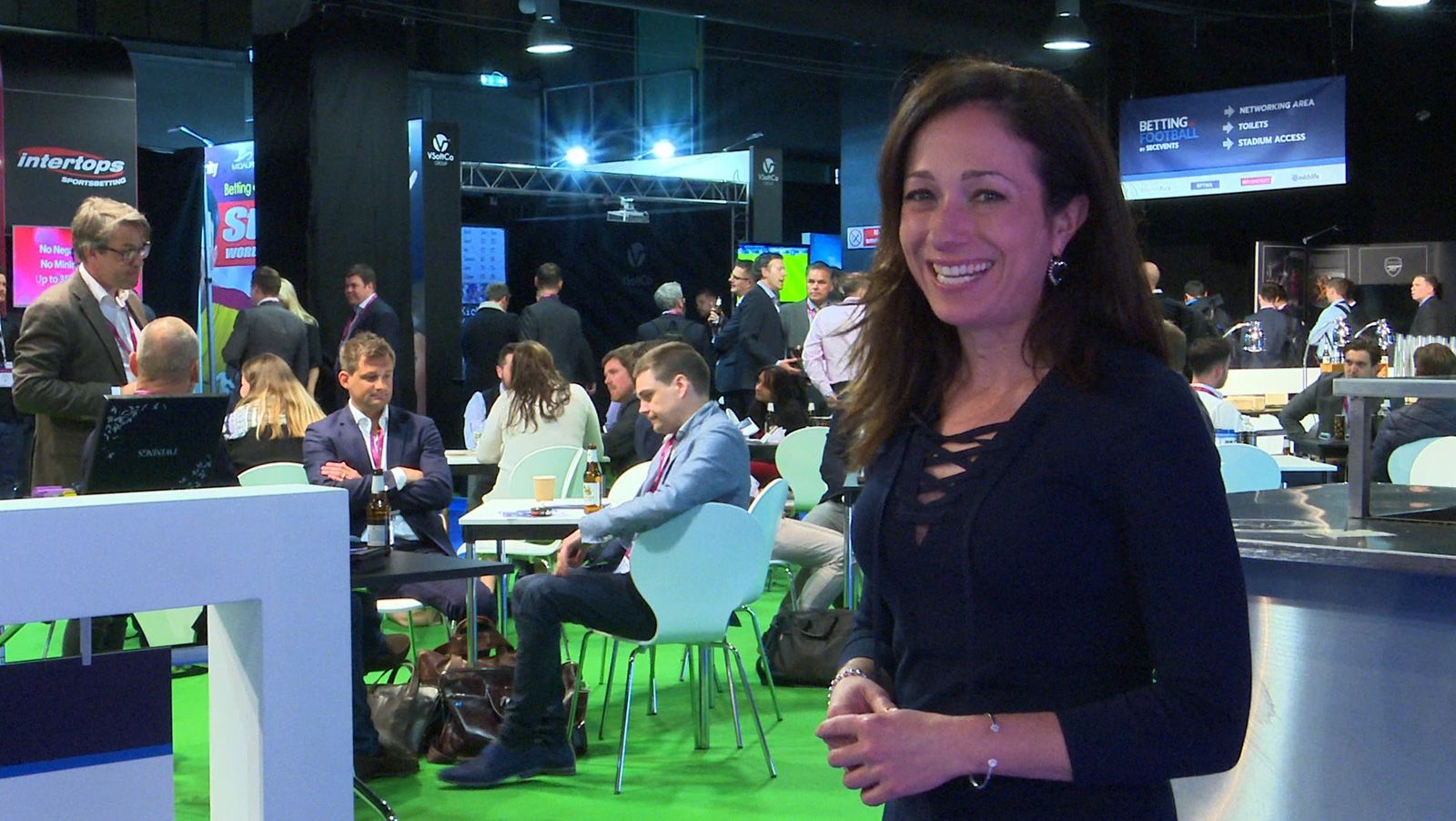The fourth annual Betting on Football Conference (BOFCON) kicked off today at London’s iconic Stamford Bridge, home to Chelsea Football Club. BOFCON has enjoyed exponential growth since its inception four years ago, a direct result of the hard work and dedication of SBC Events, the team behind the organization of the conference.
In comparison to last year’s event, the exhibition floor has quadrupled in size and attendance has increase from 400 to 1000, a clear indication of the success of the organizers and the demand for an event focused on this sector of the gaming industry in particular.
Day One of BOFCON featured a busy expo floor complete with several dedicated networking areas in addition to two conference tracks and breakout sessions. The first conference track was dedicated to leadership and covered topics such as self-regulation, preventing match-fixing, investment in sports betting companies, new brands and affiliate marketing.
The “Managing Risk – What are the Investors Looking For In the Betting Market” panel featured speakers Marek Smrha of Penta Investments, Mark Blandford of Valhalla Investments, Shay Segev of GVC Holdings, Christian Edler of Dreamworx Online Ltd and moderator Ian Hogg of GamCrowd.
Blandford started off by stating his opinion that we are in a highly entrepreneurial industry. He said the digital industry is less than 20 years old and especially with this time frame in mind, the industry has actually come a long way. We’re now seeing further development in product and technology, innovation around mobile technology and content, also in geographies- Africa for example- where there are different cultures, currency, regulatory regimes, etc.
“My inbox tells me there are still an awful lot of people seeking investments and looking to grow in this space”, Blandford shared.
When it comes to regulation, do not underestimate the regulator’s ability to make your life difficult, warned Blandford. He pointed out the example of UK betting shops and the new guidelines regarding FOBTs which will potentially lower limits and the number of machines allowed in the shops.
“You cannot be secure of earnings from regulated markets because of regulators”, he said.
Segev advised operators to create more diversified strategies and look into new territories. He said we’ll continue to see more and more countries regulated as time goes on and operators must prepare for regulations that are not there yet.
Innovation in the betting industry is still coming in a number of forms, although Hogg said if he saw another social sports betting app come across his desk at GamCrowd he will start to scream. Rather, he sees huge opportunity and growth in areas such as blockchain and artificial intelligence, “the disruption is there”, he said.
 Blandford added a few words about his investment in Coinsilium, an incubator for start-ups focused on Blockchain technology. He said he would normally invest in a company with a specific product, but his involvement with Coinsilium gives him experience with the Blockchain sector.
Blandford added a few words about his investment in Coinsilium, an incubator for start-ups focused on Blockchain technology. He said he would normally invest in a company with a specific product, but his involvement with Coinsilium gives him experience with the Blockchain sector.
“For me, as an investor, it was a way of getting to an exposure to a sector quickly instead of going into the sector and individually picking the winners”, he explained.
Today’s “Betting Leaders- Valuing Changing Dynamics” panel featured speakers David Bazak of 10Bet, Per Widerstrom of Fortuna Entertainment Group, Britt Boeskov of Kindred Group and moderator Jake Pollard of iGaming Business.
10bet has been in business for fourteen years but only in the past few years has the company expanded into new regulated markets. Bazak said taking a product that has been traditionally successful in its staple market and entering a new regulated regime has been big challenge for 10Bet over the past year and a half.
According to Bazak, there are two ways to go about entering new markets- you can “grind” your way into a market share, but it may take many years. “We’re doing it this way”, he said. Or you can strongly invest and buy your market share or acquire an existing foothold.
He also pointed out 10Bet has more flexibility to move itself around if a plan changes due to being a privately owned company vs. a publicly owned company. However, its not as easy for a private company to buy market share or acquire in new markets as it is for a public company due to financial risks and liability.
When it comes to regulated vs. unregulated markets, Bazak advised operators to be wary of how they step around these areas. “Its easy to say lets go after that cash, but what happens if what’s bringing in most of your revenue is shut down overnight?”, he said.
Widerstrom has worked with both regulated and unregulated markets in his overall experience in the gaming industry but now with Fortuna its all about regulated markets. “We believe in regulated, we want to be in regulated markets, that’s our game. We are levering what we believe are our strengths”, he said.
Over at the market profile conference track, the “North America- Is the Tide Turning for Sports Betting Support” panel featured speakers Ed Alfaro of SportsBookReview, Trading Consultant Jon Thompson, Matthew Cullen of San Manuel Digital, Quinton Singleton of NYX Gaming Group and moderator Benjie Cherniak of Don Best.
Thompson spoke from his online operator perspective and said while the US sports betting regulation push is very focused on race track and brick and mortar, he’s wondering when interested parties will come ask online operators for advice as we have years of experience in the sector.
The potential for DFS in America was unsurprisingly debated with Thompson claiming there is room for the sector alongside traditional sportsbetting, however the two DFS giants in American thought they would have the run on the market but they were “shut down pretty fast”.
The thorny issue of integrity was covered as well and the NCAA was identified as the league with the most risk of susceptibility to integrity issues. Cherniak clarified college athletes are not allowed to be paid, yet there is so much betting on their games, so college leagues are at the highest risk of integrity issues.
Thompson said the professional league athletes are making so much money it’s different story for them. “Until we can come up with a plan that convinces authority that we can avoid any integrity issues with college, we’re going to have a problem. If you don’t solve the NCAA problem, we don’t get sports betting”, he said.
All panelists agreed the media’s coverage of betting odds has helped bring sports betting into a more acceptable arena culturally in America. Alfaro mentioned ESPN showing odds and broadcasters mentioning lines, Cullen mentioned ESPN Chalk, a commentary all about sports betting and Thompson mentioned the increased demand for novelty bets, especially those related to President Trump. “This excites USA Today”, he said.
Over on the expo floor there was plenty of activity, especially at the VSoftCo booth where a virtual football game was set up for delegates to enjoy. VSoftCo Sales Director Simon Westbury confirmed his virtual football product is an easy sell as operators can see adding it to their suite of offerings will increase returns by 20%.
Westbury talked on VSoftCo’s relationship to Sheffield United Football Club and how the company undertook one week of motion capture filming with the club to sharpen their virtual games portfolio. He added what a wonderful job SBC founder Rasmus Sojmark and his team have done with BOFCON, propelling the event into the prefect opportunity for exhibitors such as VSoftCo to reveal their latest product offerings.
